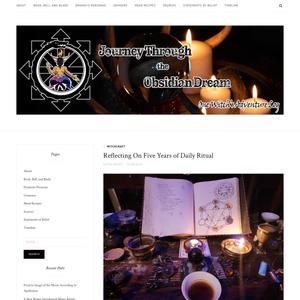

"We need regular rituals that compel us to turn & face the difficulties, the failures, the woe, the underside of things; spaces where we're obliged to confront & work through what we might otherwise avoid. Our lives and health would improve vastly if we did such things."
— James Davies
Annie Dillard wrote "how we spend our days is of course how we spend our lives."
What are your values and priorities in life and how are they reflected in your everyday? How were they reflected in your day today?
The people you prioritize in life, the people that prioritize you in life, how is this reflected in your daily lives? What steps do you take for them day to day, and do they take them for you?*
*Of course this is bearing in mind that there are off days, it is not linear, we take the bigger steps sometimes, they take the bigger steps for us other times, but there should be patterns you can see that help answer
I’ve noticed that the people who lament that we “have no rituals left” in our society are often the same people who are anti-marriage, or just go to the courthouse. Who don’t walk at their graduation ceremonies. Who don’t wear black lace to funerals. Who don’t own a suit. Who don’t send Christmas cards or take off shoes at the door or take into account the folk superstitions their mother did. They instead devise their own ceremonies and perform them alone.
Do we not have ritual? Or do we just rebel against the most salient ones to our culture, while seeking foreign ones with less baggage? Might grappling with the baggage be an inherent part of ritual? Ritual requires communal participation to be effective. Everyone making their own is just more isolation.
I love weddings, funerals, graduations. I think institutions matter. I love hanging Christmas lights, sending an annual card, and baking. I love giving candy to trick or treaters and dressing up. I love thanksgiving dinner. I...
When you choose your friends today, you are choosing your habits tomorrow.

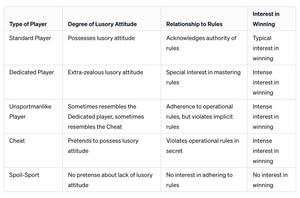
When performing a ritual, we make the part of ourselves that participates in the ritual like the ritual. We give up a bit of requisite variety, shape our range of motion, act in structured ways, to gain what the ritual has to offer. When many of us participate in a ritual, we each become the like the ritual. The ritual is an interface, a common set of procedures. It can act as a stable point of coordination, a “source-of-truth”, in software terms, or a lego dot that helps us click together. In this way, rituals can be a kit for constructing community. Perform the ritual together, and a particular kind of community will emerge around it. Rituals channel our collective energy in a particular shared direction. There are returns to scale on coordination, so, ritual is adaptive.
When we don’t know what else to do, we can trust the process. Rituals get us out of deadlock by providing scripts to play out when we’ve lost the plot. Maybe it’s the right script, maybe not. Either way, rituals keep us moving.
Seven thoughts on ritual:
- Rituals are the feedback loops we construct to construct ourselves.
- Rituals shape the medium of time.
- Rituals orient us.
- Rituals are protocols.
- Ritual is a form of play.
- Rituals take place in a world set apart.
- Rituals make meaning
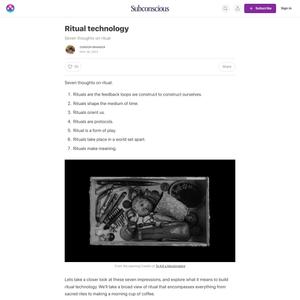
almost 2 years ago
The fundamental imperative of all ritual is that one cannot do it alone; man cannot impart life to himself but must get it from his fellow man. If ritual is a technique for generating life, then ritual organization is a necessary cooperation in order to make that technique work.
Rituals are actions performed by people that bring higher — and perhaps illogical, magical, and delightful — meaning into their experiences. Rituals help people to make sense of their life-stages, to construct meaning at personal and societal levels, and to color their rather uneventful ordinary lives. They can take many forms: performed by individuals or by groups, in loud and dramatic scales or small and intimate ones.
Rituals are architectures of time, structuring and stabilising life, and they are on the wane. The pandemic has accelerated the disappearance of rituals. Work also has ritual aspects. We go to work at set times. Work takes place in a community. In the home office, the ritual of work is completely lost. The day loses its rhythm and structure. This somehow makes us tired and depressed.
In The Little Prince [1943], by [Antoine de] Saint-Exupéry, the little prince asks the fox to always visit at the exact same time, so that the visit becomes a ritual. The little prince explains to the fox what a ritual is. Rituals are to time as rooms are to an apartment. They make time accessible like a house. They organise time, arrange it. In this way you make time appear meaningful.
Time today lacks a solid structure. It is not a house, but a capricious river. The disappearance of rituals does not simply mean that we have more freedom. The total flexibilisation of life brings loss, too....
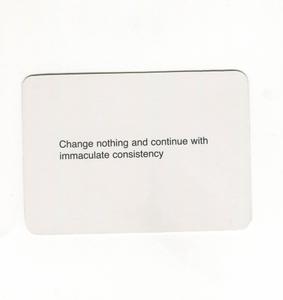
when organizing my physical space, i ask myself questions about objects/spaces to reflect on how i interact with them. a question i instinctively ask first is "how (often) do i use ___?", the answer being a use-case and its frequency. in the last few days, i reframed the question as "how (often) do i referecne this?", which is similar in nature, but yields different, les usability-centric answers.
how does this relate to environment design for good rituals? how can a similiar reframing affect digital spaces?
I like morning rituals: They’re a way of liberating time
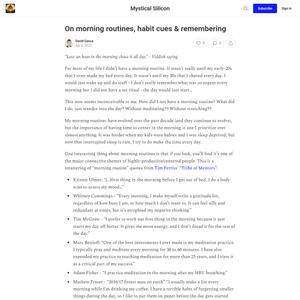
The world seems to be accustomed to delaying gratification less and less, which means the rewards of delaying gratification grow more and more.
One of the main benefits of physically going to a place of work, is that the new space marks the delineation of a new game. Putting on different clothes acts as a work-specific costume. This new game has special rules, special characters and special scripts… When I log into work from home, only a few steps from where I am normally play with my kids, my persona is intermixed and it takes time switch. Like muddy rivers from combined tributaries, it takes time to change mindsets and roles. At the end of the day, after hours in work mode, it also takes time to reverse the process…
Snowman utters a reference from Kurt Vonnegut's Slaughterhouse Five:
"It is the strict adherence to daily routine that tends towards the maintenance of good morale and the preservation of sanity," he says out loud. He has the feeling he's quoting from a book, some obsolete, ponderous directive written in aid of European colonials running plantations of one kind or another.
through repetition i make things real for myself. the more i say something the more i become sure of it. the more i try something the better i get at it. through repetition the things i believe and the things i make become natural to me – like the seasons, the phases of the moon, or the rising and setting of the sun. they evade my own anxiety. i no longer doubt them. they become rituals. they ground me.